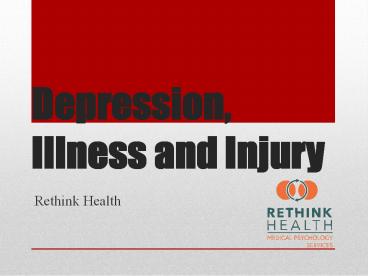Depression, Illness and Injury - PowerPoint PPT Presentation
Title:
Depression, Illness and Injury
Description:
Feeling unusually low in mood or depressed is not uncommon following critical illness or injury. For instance, up to 30% patients experience low mood in the months that follow a heart attack (Baumeister et al., 2011) or an intensive care admission – PowerPoint PPT presentation
Number of Views:39
Title: Depression, Illness and Injury
1
Depression, Illness and Injury
- Rethink Health
2
About
- Feeling unusually low in mood or depressed is not
uncommon following critical illness or injury.
For instance, up to 30 patients experience low
mood in the months that follow a heart attack
(Baumeister et al., 2011) or an intensive care
admission (Wade et al., 2012). - Patients often describe a sense of irony that
in the weeks that follow discharge from hospital,
once they are safely home and surrounded by
relieved family and friends, that distressing
psychological reactions such as low mood should
then start to occur.
3
- The first thing to emphasise is that feeling low
after a hospital admission is common and people
often recover independently within a month of
being home. - Ensuring good sleep hygiene, taking regular
exercise, following a healthy diet and (if
relevant) smoking cessation are all
well-established first-line strategies for
improving mood. - For some people, low mood can persist, despite
implementation of these basic self-care
strategies. In these circumstances, we recommend
patients meet with a clinical psychologist or
discuss with their GP.
4
Symptoms of Depression
- The main symptoms of depression are a loss of
pleasure in activities that were once enjoyable.
A person with depression may also feel tearful,
irritable or tired most of the time, and have
problems with sleep, concentration and memory. - Mild to moderate depression is when a person has
symptoms that make life more difficult than
usual, while severe depression is when a person
has many symptoms, which can make life extremely
difficult.
5
- For mild-moderate depression, anti-depressant
medication is not recommended in the UK. Instead,
National Guidelines (NICE 2009) recommend that
patients receive Cognitive-Behavioural Therapy
(CBT) with a psychologist. - CBT refers to a collection of psychological
treatments that are based on the theory that
thoughts, feelings, behaviour and our
physiological responses are all connected. If we
change one of these, we can alter the others. - For moderate-severe depression, antidepressant
medication is recommended alongside a
psychological treatment.
6
About Rethink Health
- Rethink Health specialises in providing
psychological treatments for adults who are
experiencing low mood or depression. - We work online with people from all over the
country. Research evidence is clear that online
sessions achieve similar outcomes to in-person
sessions and are equally or more effective. - For more information about Medical Psychologist
visit Rethink Health https//www.rethinkhealth-on
line.com
7
Rethink Health
8
- THANK YOU































